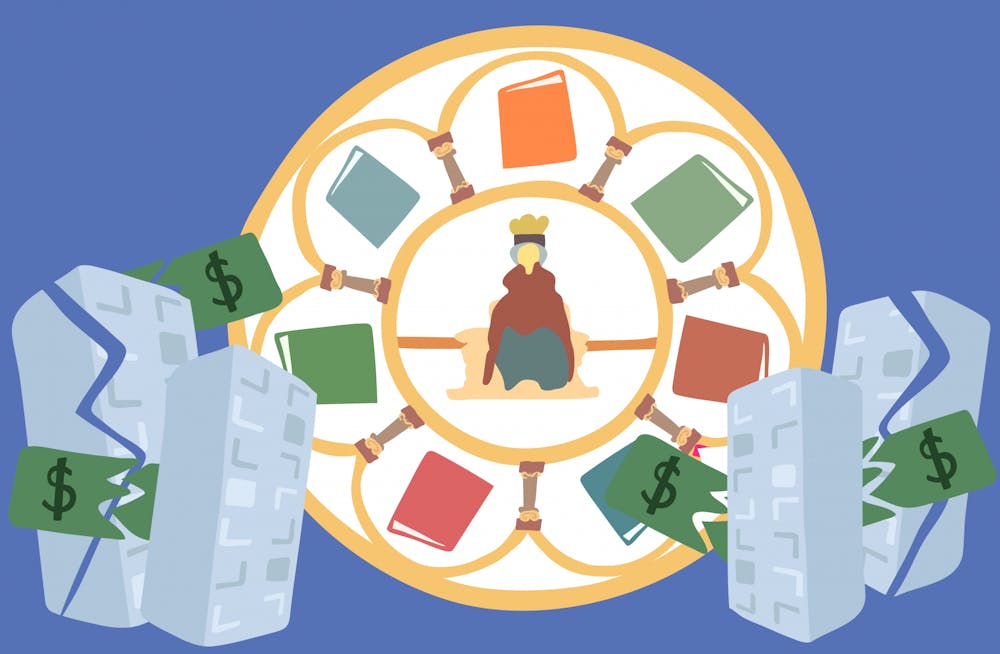Thought is dead and liberal arts have killed it. How shall we comfort ourselves, in the midst of the murder of all murders?
Penn claims to be an archetype of an educational institution that is going to create the leaders of the future, freethinkers, and open communicators. But does this narrative deliver a false promise? Are we truly preparing leaders who are going to change the world, or are we generating mere productive machines that will perpetuate the oppressive structures of the socioeconomic system in the status quo?
The typical narrative associated with liberal arts education is that even though intellectual depth may be lacking — especially relative to some European models — we benefit from intellectual breadth and critical thinking. I argue that in the College of Arts and Sciences, we trade intellectual depth for being markedly lucrative. The peace symbol near the Van Pelt Library best signifies the metaphorical misguidance, irony, and impotence of liberal arts education today. Peace, outside the context of ongoing military conflict, is not a revolutionary goal. Peace is the unchallenged continuation of a power dynamic. If the power dynamic is exploitative and oppressive, being peaceful means being a reproductive tool of the system rather than the origin of its change.
To think critically means to maintain a critical discourse. One could not, after critical analysis, examine a world full of prejudice, economic exploitation, and other injustices and refrain from demanding radical change. If they do so, they failed to think. Peace is a luxury of the privileged to keep their privilege uncompromised. If we want leaders capable of changing the world of tomorrow, we need more radicals.
While the pre-professionalism at Penn is an integral part of our school's identity, it should not come at the expense of liberal arts education. Specifically, the College of Arts and Sciences should not to try to emulate and compete with the level of pre-professionalism fostered at the Wharton School of Business.
An example of the influence of pre-professionalism on the College is the economics curriculum's primarily quantitative focus. As a result, one can comfortably graduate with an economics degree from Penn without ever reading Marx’s critique of capitalism, alternative economic schools of thought, or critical approaches to mainstream teachings of economy. We can improve the world with thinkers that are taught to be critical and radical in their demands, not with students who are disconnected from socio-economic issues and who won't question the social norm.
Albeit guilty of such a transgression, Penn’s liberal arts curriculum is not exclusively to blame. According to Malcolm Harris — the author of "Kids These Days" — this is rooted in a bigger problem with higher education in the United States. Harris believes that higher education has transformed into either a workplace or a profit machine. His book targets exponentially growing student debt and the institutional wealth accumulation it has generated. Whereas outsourcing and workforce casualisation have lowered expenses of running a university, the price of tuition has increased over 200 percent in the last three decades. This institutionalized debt machine, he believes, benefits everyone but students. And when the cost to get such education is astronomical, so is the structural incentive on students to make their degrees as market-complicit and efficient as possible.
As a student previously intending to double major in mathematics and philosophy and now considering, instead, pursuing a degree in economics, I must say that I have faced the pressure first-hand. Penn, among other universities, excels in the commodification of human capital. Wharton professor Adam Grant once said, “Penn is more pre-professional than any elite institution that I’ve had exposure to, and the pressure kicks in earlier to make sure your grades are perfect and to have a great internship … When I was at Harvard, I literally did not know what internships were.” He adds, “The fact that we have freshmen who are getting internships, to me, is absolutely absurd.” The pre-professionalism within liberal arts fosters a culture that is almost mutually exclusive with intellectualism. It creates an intellectual facade that prepares students, more than anything, to be productive.
SEE MORE FROM ARTUR VLLAHIU:
This mindset is fostered early on. Malcolm Harris explains that even primary and secondary education possesses hidden processes of labor capitalization, as he puts it, a “pedagogical mask.” He says, “When students are working, what they’re working on is their own ability to work.” He adds that “childhood is the time to accumulate the skills and abilities necessary to compete in a tough adult job market,” an “arms race that pits kids and their families against each other in an ever-escalating battle for a competitive edge.” This competitiveness can be seen in the ruthless college application process.
According to philosopher Arthur Schopenhauer, humans rely on their experience of the world to formulate ideas. Thus, ideas are generated as a consequence of observations. He believes that education inverts this dynamic; in it, idea precedes experience. A students' observations are substituted with the observations of others. We become accustomed to the dynamic of possessing ideas without undergoing the generative process. We become passive thinkers if thinkers at all. In this sense, education perverts the mind. Schopenhauer says, “He has never attempted to abstract fundamental ideas from his own observations and experience because he has got everything ready-made from other people; and it is for this very reason that he and countless others are so insipid and shallow … Even if their thoughts are correct, they do not know why they are correct.” I think the commodified liberal arts education now is as close to an approximation as one could get to the Shopenhaurian educational dystopia.
He who is void of all radical thought is void of thought itself.









